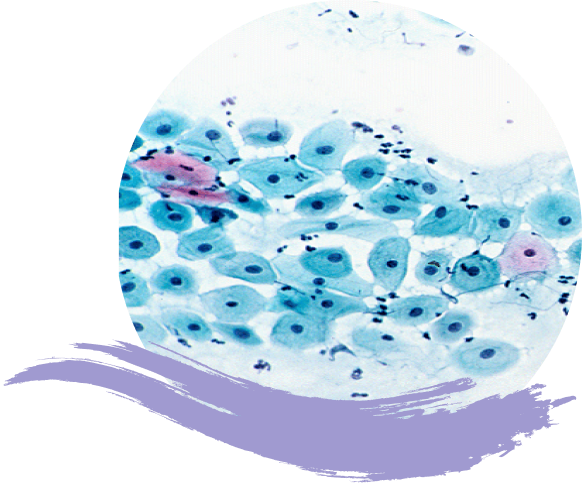Gynaecology
Cerba Path assists gynaecologists in monitoring women's health. In addition to screening for cancer of the cervix (HPV test and cytological examination of the cervico-uterine smear carried out on a single sample), our pathologists work on gynaecological tumours (breast, uterus, ovary, fallopian tubes, vagina, vulva, cervix, etc.) to establish diagnoses and to provide prognostic and predictive information that will help guide the therapeutic response. They can also diagnose a range of infections, illnesses such as endometriosis (via analysis of biopsies or surgical specimens) and, by assisting in the orientation of etiological research, help clinicians to diagnose of ectopic pregnancy or spontaneous miscarriage.
Hepato-gastroenterology
Gastroenterologists call on our expertise to explore digestive diseases, whether non-tumorous (Helicobacter pylori infection, celiac disease, chronic colitis, etc.), tumorous (benign or malignant), malformative, pre-neoplastic (polyps, etc). Also integral to the work of Cerba Path are such services as the assessment of hepatopancreatic lesions, diagnostic and prognostic evaluations following the discovery of abnormalities in the liver and assessments of the liver’s functional state (fibrosis).
Dermatology
Our dermatological activities focus in particular on the analysis of suspicious nevi. In the majority of cases, our examinations rule out cancer. When cancerous lesions are discovered, however, we establish the specific diagnosis (melanoma, carcinoma, etc.) and provide inputs for the prognosis. We are also called upon to examine inflammatory pathologies (lupus, psoriasis, eczema, etc.), especially in those cases where the diagnosis is difficult to establish and/or where the disease is proving unresponsive to treatment.
ENT
Cerba Path’s expertise covers the entire range of ENT and thyroid cancers. We analyse samples of every type: oral or pharyngeal lesions, inflammatory lesions of the naso-sinus mucosa, salivary glands, needle biopsies of the thyroid...
Our ENT activities also include analysing samples from surgical procedures (tonsillectomy, adenoidectomy, polypectomy, thyroidectomy).
Orthopaedics
Joint replacement (hips, knees) accounts for the bulk of our work in orthopaedics: we analyse the samples taken in the operating theatre.
Our pathologists also examine samples taken for diagnostic purposes, notably in cases of doubt or when the clinical situation appears atypical: analysis of joint fluid samples in cases of infection and where microcrystalline arthritis (gout, articular chondro-calcinosis) or chronic synovitis, for example, is suspected. We also analyse bone and cartilage tumours.
Placenta
Anatomopathological examinations of the placenta, carried out by our pathologists, are systematic in the event of a pathological pregnancy (intrauterine growth retardation, toxemia of pregnancy, abnormal position of the placenta, etc.) or incidents during childbirth (suffering of the foetus, mother-to-child infection). These analyses can help identify the causes of these events and improve the management of future pregnancies.
Pulmonology
Pulmonologists call on our pathologists primarily for the diagnosis and prognosis of bronchopulmonary cancers. We therefore look for and analyse tumour cells in a large variety of sample types (biopsies, pleural punctions, bronchial aspirations, etc.). We also engage in the diagnosis of non-tumorous pathologies, most frequently inflammatory (for example, bronchiolitis obliterans organizing pneumonia - BOOP) but also infectious (tuberculosis, for example), as well as in assessments of fibrosis.
Urology
Urine cytology, the purpose of which is essentially diagnostic (the search for cancerous cells) is Cerba Path’s principal activity in urology. Our pathologists also examine tissue samples taken by urologists during investigations of the urinary tract (bladder lesions for example) and prostate biopsies (essentially for diagnostic and prognostic purposes in prostate cancer). They also examine surgical specimens and material from biopsies relating to kidney cancer, testicular tumours, and sometimes testicular biopsies as part of an infertility assessment.



